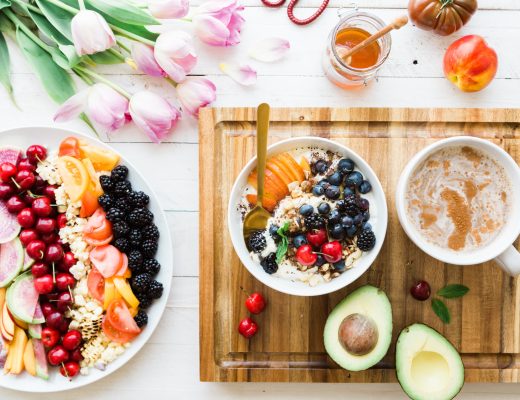This time you feel sure. You feel it in your bones! You’re going to reach your goals! You’re going to drink more water, eat tons of vegetables, meal prep all your meals, hit the gym every day, and you’re going to kill the game! You’re motivated and excited and you’ve set all these goals for yourself and you’re dead sure that you’ll hit them all…but in the coming days, you don’t.
You slip up on a meal, eat something unhealthy, and tell yourself you’ll make up for it later, or you’ll start over tomorrow, and suddenly you’re right back where you started and you feel like an utter failure.
We’ve all been there. Not only have we been there, most of us have revisited that dark place over and over again until the intensity of that initial excitement gets weaker with each failure and you curse at your own weakness. But it doesn’t have to be that way.
Why is it that some people reach their goals and others don’t? It all boils down to a few key factors that have the power to make or break your goals.
Consistency
Let’s start off with the most important factor – consistency. Without consistency, you can’t achieve anything. There is consistency even in all your failures. It’s not magic that stops you from doing the things you KNOW you need to do to get where you want to be. You end up in that situation with consistency…consistently making unhealthy choices, consistently giving in to temptation, consistently ignoring the small voice in your head that tries to stop you from making the wrong decision. Consistency is the one thing that is present in all your wins and losses and with the right basket of tools, you can turn the tide and make consistency work FOR YOU instead of against you.
You might confuse consistency with willpower. However, reaching your goals is not about willpower. A lot of people criticize themselves every time they fail at reaching their goals and fall into the trap of thinking that maybe they’re just not strong enough, that maybe they just don’t have the willpower. But, willpower is a limited resource. We all have finite amounts of it and no matter how hard you try, you can’t force your mind to stay strong all of the time.
This is where habits come in!
Habit Building
When you wake up and head to the bathroom to start your day and brush your teeth, you don’t think about it. You just do it. When you get into the car, you put your key in the ignition and turn it, and then put your car in drive. You don’t think about it. You just do it. You perform hundreds of complicated tasks every day that you don’t think about, that you don’t have to force yourself to do. You don’t have to fight with your own brain and use your precious stash of willpower. Your brain is on autopilot and you don’t need anything else!
These actions are your habits kicking in! When you’ve performed a task hundreds and thousands of times, you no longer have to force yourself to do them, it becomes a natural part of you and requires no effort on your part to execute. The key to reaching your goals is to turn all the tasks you need to perform into habits. How can we achieve this? Set cues!
Have you ever heard the advice to set out your workout clothes every night, or even sleep in your workout clothes, or have your gym bag ready to go by the door every night if you want to make working out a daily practice? There’s a reason this advice is so powerful – it’s the first step in building a new habit.
Set up a cue → Triggers a specific routine → Eventually becomes a habit.
When you set up a cue, you train your brain to automate a task. When you set a plate of food in front of yourself, you start eating, because your brain has been trained to associate that cue (plate of food in front of you) with eating.
To build healthy habits, instead of focusing on breaking old ones, which is hard and can be very mentally and emotionally draining, shift the focus to building new ones instead.
Try this: If you’re trying to drink more water on a daily basis, find a large water bottle in your house, fill it up every night, and bring it along with you everywhere you go the next day. You’ll find yourself drinking more water automatically, eventually being able to finish that entire bottle every single day!
Initially, you might face some resistance, and for some, it still might be challenging, but by using the same cue-trigger process, you’ll eventually turn the task into a habit. If you find yourself coming home with the bottle still full after a few days in, you can set up a second cue, such as setting an alarm reminder to drink some water at every work break. All we really need is some automation in the form of cues and some gentle reminders.
You can use this same process to make ANY new habit easy to build. Just remember that it will still be a little challenging in the beginning, but by consistently following the routines that your cues trigger, you’ll be setting yourself up for ultimate success!
Tuning out the Noise
If you want to know something, knowledge is just a click away. The internet is filled with all sorts of theories, studies, advice, and facts. So, it’s no surprise that we constantly experience information overload! Our brains are not equipped to effectively deal with such an influx of constant information, especially given the fact that so much of the information out there can be contradictory, or even flat out wrong. And, oh the choices! For example, if you’re trying to lose or gain weight, you have all these options – Keto, Paleo, HCLF, LCHF, Mediterranean, count calories, don’t count calories, the list simply never ends.
Should you eat bread? Is dairy bad for you? Is fat bad for you? Does fruit make you fat? Doctors and nutritionists are constantly divided on these topics, the research can often be biased based on the funding source, and the truth is almost always more complex than a simple yes or no.
What’s the bottom line?
The bottom line is that if you constantly focus on all these questions, you’ll end up hopping from diet to diet, confused and not quite sure what’s true and what’s not. Something that’s FAR better is to use your own common sense, tune out all the noise, and listen to your body. And, when I say listen to your body, I don’t mean you should go out and stuff your face with a dozen donuts because your body wants donuts. Rather, it’s about carefully assessing how your body reacts to certain foods and becoming more attuned to which foods make you feel the best.
Some people may notice they get very bloated if they eat a lot of wheat. This might mean laying off the bread for a day or two and assessing how that makes you feel. Or you might eat a lot of fruit one day and find that it gives you a lot of energy, or maybe it gives you too much of a sugar rush. Everybody is unique – this is called “Bio-Individuality” – and it means that what works for one person doesn’t necessarily work for the next person.
The first step is to just start consuming more natural and wholesome plant-based foods. Tune out all the other noise. Don’t jump on the new diet train just because that’s what everyone is harping about right now. Tune out the noise, and listen to your body instead and once you have a better relationship with your own body, you can start experimenting more and see what works best for you.
Self-Love
All the advice written here is completely useless without self-love. Too often, we become our own harshest critics. We say mean things to ourselves, we put ourselves down, we taunt ourselves when we mess up. If you had a friend who had a boyfriend or girlfriend even half as mean to your friend as we can be to ourselves sometimes, you would tell your friend to break up with their toxic partner immediately.
Don’t be toxic to yourself. Break up with that mean and emotionally abusive voice inside your head. When you operate from a place of hate and when you try to make changes to your body because you can’t stand the person staring back at you in the mirror, you set yourself up for failure and even worse, self-sabotage.
When you already hate the way you look, and you mess up, it’s easy to sabotage yourself and justify further bad decisions. “I’m such a loser, I always mess up! Ugh, now that I’ve already messed up, I might as well screw up again and skip going to the gym today too!”
Your inner dialogue might not be as dramatic as that, but it’s probably some variation of that sentiment. We’re all guilty of this loop of self-sabotage.
To break the cycle, you have to learn to love yourself. You need to understand the importance of self-care. Make healthier choices not because you hate yourself, but because you love yourself so much that you want the absolute best for yourself.
And remember, you WILL mess up sometimes, you will make mistakes, but just like you would help your friend get back up after a fall, help yourself get back up too.
When you step into a mental and emotional space of love, understanding, and most importantly, kindness, you’re far more likely to make better decisions and reach your goals.
Action Time
Words are just pixels on a screen if you don’t go out and put them into action. If you’re here, you’ve already taken the first step in loving yourself enough to want to change your life for the better. Now all you have to do is put your plans into action.
Focus on setting up cues and routines for all the goals you want to reach. Take baby steps. Practice self-love. Tune out everything unimportant. And most importantly, stay consistent!
By using these tools, you have the power to reach any health goal you set for yourself!







No Comments